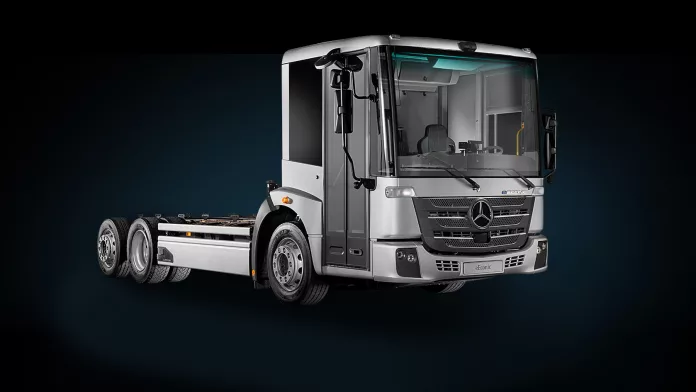Imagine an aviation world humming with the soft whir of electric motors, as ground vehicles and airplanes alike forgo traditional fuel in favor of clean, electric energy. Such innovation is not just a dream; it’s becoming a reality, with Mercedes-Benz and Airbus leading the charge.
Revolutionizing Airport Ground Operations with Electric Technology
Take a moment to picture the bustling operations at any airport. Ground vehicles are in a constant flux, transporting fuel, luggage, and passengers, their engines contributing to the cacophony and emissions. Now, envision a shift towards a quieter, cleaner environment with Mercedes-Benz at the helm. The auto giant has joined forces with various partners, including tank body specialist Esterer, to design a cutting-edge battery-powered vehicle specifically for refueling airplanes.
The result of their collaboration is the eEconic: a battery-electric truck boasting a 40,000-liter capacity for jet fuel transportation. This electric powerhouse takes sustainability to new heights, harnessing energy from its own batteries to power the refueling pump. The truck’s dimensions are tailored to navigate easily under the wings of commercial airlines, facilitating a seamless refueling experience.
The eEconic’s two electric motors deliver an impressive 330 kW of continuous power, allowing for a noiseless, more thermally efficient operation. Just a single hour of charging per day is enough to keep this electric maven running without interruptions throughout its ground handling duties at Stuttgart Airport, actively contributing to the airport’s STRzero climate initiative.
Excited about its growing application flexibility, Mercedes-Benz celebrates the eEconic’s role in reducing emissions and improving the quality of work life for airport personnel engaged in refueling tasks.
Airbus Unveils its Innovative eVTOL Aircraft
In a venture that spurs the imagination, Airbus steps into the limelight with something refreshingly innovative. After a five-year development period, the aerospace corporation has lifted the curtain on its first battery-electric powered VTOL (vertical takeoff and landing) aircraft. Comparing it to an oversized moth may bring a smile, but its design is nothing short of remarkable, boasting eight electric motors and a capability for fixed-wing flight.
The CityAirbus prototype, with its futuristic V-shaped tail and quiet operation, redefines urban transportation. Its specifications boast impressive sound levels and the potential to ferry passengers across urban landscapes effectively and efficiently. The arrival of this two-ton class aircraft aligns with Airbus’ strategic vision for Advanced Air Mobility.
The freshly inaugurated CityAirbus test center in Donauwörth marks a strategic investment by Airbus in the future of electric flight. Here, the CityAirbus will undergo comprehensive testing before its anticipated debut flight. Moreover, Airbus’ commitment to building a sustainable air mobility ecosystem is further underscored by its recent partnerships aimed at shaping the AAM market’s future.
Electrification: A Panacea for Transportation Emissions
While electric vehicles dominate the headlines, a broader electrification movement is quietly advancing. The transportation sector, which includes everything from construction equipment to airplanes, needs an electric overhaul to address our planet’s rising temperatures meaningfully.
While an individual electric tanker truck like the eEconic may not make a dent in global carbon figures, it sends a resounding message: electric vehicles are not futuristic fantasies but today’s sustainable solutions. Similarly, Airbus’ eVTOL initiatives could revolutionize urban commuting, alleviating congestion and providing convenient alternatives to car ownership.
These advancements from Mercedes-Benz and Airbus are key pieces in the vast mosaic of global transportation electrification. They represent not just technological progress but an ongoing revolution that’s reshaping our journey toward a greener future.


























